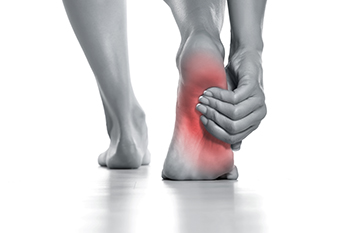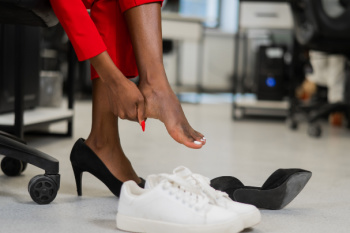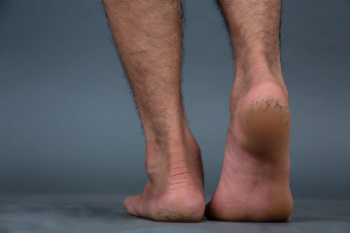Items filtered by date: June 2024
Why Shoes Can Make Heels Hurt and How to Prevent It

Wearing the wrong shoes can cause heel pain due to poor arch support, insufficient cushioning, or an improper fit. High heels or shoes with a rigid sole can strain the plantar fascia, the ligament connecting the heel to the toes, leading to discomfort. Shoes that are too tight or too loose can also cause friction and pressure points, resulting in heel pain. To prevent this, choose shoes with proper arch support and ample cushioning to absorb impact. Ensuring a correct fit is vital, as shoes should have enough room for your toes and provide a secure fit at the heel. Opt for shoes with a slightly raised heel and a flexible sole to support natural foot movement. These measures can alleviate heel pain and promote overall foot health. If you have heel pain that could be a result of wearing shoes that do not fit right, it is suggested that you consult a podiatrist who can offer you treatment solutions, and guide you toward wearing the right shoes.
Many people suffer from bouts of heel pain. For more information, contact Edward S. Pozarny DPM of Arlington Podiatry Center. Our doctor can provide the care you need to keep you pain-free and on your feet.
Causes of Heel Pain
Heel pain is often associated with plantar fasciitis. The plantar fascia is a band of tissues that extends along the bottom of the foot. A rip or tear in this ligament can cause inflammation of the tissue.
Achilles tendonitis is another cause of heel pain. Inflammation of the Achilles tendon will cause pain from fractures and muscle tearing. Lack of flexibility is also another symptom.
Heel spurs are another cause of pain. When the tissues of the plantar fascia undergo a great deal of stress, it can lead to ligament separation from the heel bone, causing heel spurs.
Why Might Heel Pain Occur?
- Wearing ill-fitting shoes
- Wearing non-supportive shoes
- Weight change
- Excessive running
Treatments
Heel pain should be treated as soon as possible for immediate results. Keeping your feet in a stress-free environment will help. If you suffer from Achilles tendonitis or plantar fasciitis, applying ice will reduce the swelling. Stretching before an exercise like running will help the muscles. Using all these tips will help make heel pain a condition of the past.
If you have any questions please contact our office located in Arlington, VA . We offer the newest diagnostic and treatment technologies for all your foot and ankle needs.
Gout Pain Can Be Managed
Symptoms and Causes of Plantar Fasciitis

Foot pain can significantly disrupt daily activities and diminish quality of life, and plantar fasciitis is one of the main culprits. The plantar fascia is a thick band of tissue that stretches from the heel to the toes, supporting the foot’s arch and helping with movement. When this tissue becomes inflamed, it results in plantar fasciitis. This causes sharp heel pain that is especially noticeable with the first steps in the morning or after long periods of inactivity. Common causes of plantar fasciitis include biomechanical issues like flat feet or high arches, and overuse from activities such as running. Wearing shoes that lack proper support, tight calf muscles, and additional stress from excess body weight are other causes. Managing plantar fasciitis typically involves stretching exercises to relieve tension, wearing supportive footwear, and using orthotic inserts. Preventive measures focus on proper footwear and maintaining flexibility in the lower legs through regular stretching. If you are suffering from persistent heel pain, it’s suggested that you schedule an appointment with a podiatrist for an exam and suggestions for treatment, which can begin your journey to recovery and improved foot health.
Plantar fasciitis can be very painful and inconvenient. If you are experiencing heel pain or symptoms of plantar fasciitis, contact Edward S. Pozarny DPM from Arlington Podiatry Center. Our doctor can provide the care you need to keep you pain-free and on your feet.
What Is Plantar Fasciitis?
Plantar fasciitis is the inflammation of the thick band of tissue that runs along the bottom of your foot, known as the plantar fascia, and causes mild to severe heel pain.
What Causes Plantar Fasciitis?
- Excessive running
- Non-supportive shoes
- Overpronation
- Repeated stretching and tearing of the plantar fascia
How Can It Be Treated?
- Conservative measures – anti-inflammatories, ice packs, stretching exercises, physical therapy, orthotic devices
- Shockwave therapy – sound waves are sent to the affected area to facilitate healing and are usually used for chronic cases of plantar fasciitis
- Surgery – usually only used as a last resort when all else fails. The plantar fascia can be surgically detached from the heel
While very treatable, plantar fasciitis is definitely not something that should be ignored. Especially in severe cases, speaking to your doctor right away is highly recommended to avoid complications and severe heel pain. Your podiatrist can work with you to provide the appropriate treatment options tailored to your condition.
If you have any questions please feel free to contact our office located in Arlington, VA . We offer the newest diagnostic and treatment technologies for all your foot and ankle needs.
Fixes for Foot Pain
 Foot pain can be debilitating, affecting daily activities and quality of life. Thankfully, several remedies can alleviate discomfort. Massaging the feet can help relax muscles and improve circulation, providing temporary relief. Custom orthotic inserts or wearing supportive footwear can provide long-term relief by correcting biomechanical issues and providing proper arch support. Stretching exercises can also improve flexibility and reduce muscle tension in the feet. However, if you have foot pain that persists or worsens despite these remedies, it is suggested that you seek professional help from a podiatrist who can diagnose the underlying cause of the pain and provide personalized treatment options.
Foot pain can be debilitating, affecting daily activities and quality of life. Thankfully, several remedies can alleviate discomfort. Massaging the feet can help relax muscles and improve circulation, providing temporary relief. Custom orthotic inserts or wearing supportive footwear can provide long-term relief by correcting biomechanical issues and providing proper arch support. Stretching exercises can also improve flexibility and reduce muscle tension in the feet. However, if you have foot pain that persists or worsens despite these remedies, it is suggested that you seek professional help from a podiatrist who can diagnose the underlying cause of the pain and provide personalized treatment options.
Foot Pain
Foot pain can be extremely painful and debilitating. If you have a foot pain, consult with Edward S. Pozarny DPM from Arlington Podiatry Center. Our doctor will assess your condition and provide you with quality foot and ankle treatment.
Causes
Foot pain is a very broad condition that could be caused by one or more ailments. The most common include:
- Bunions
- Hammertoes
- Plantar Fasciitis
- Bone Spurs
- Corns
- Tarsal Tunnel Syndrome
- Ingrown Toenails
- Arthritis (such as Gout, Rheumatoid, and Osteoarthritis)
- Flat Feet
- Injury (from stress fractures, broken toe, foot, ankle, Achilles tendon ruptures, and sprains)
- And more
Diagnosis
To figure out the cause of foot pain, podiatrists utilize several different methods. This can range from simple visual inspections and sensation tests to X-rays and MRI scans. Prior medical history, family medical history, and any recent physical traumatic events will all be taken into consideration for a proper diagnosis.
Treatment
Treatment depends upon the cause of the foot pain. Whether it is resting, staying off the foot, or having surgery; podiatrists have a number of treatment options available for foot pain.
If you have any questions, please feel free to contact our office located in Arlington, VA . We offer the newest diagnostic and treatment technologies for all your foot care needs.
Understanding and Preventing Cracked Heels

Cracked heels occur when the skin on the heels becomes dry, thickened, and fissured, often leading to discomfort and cosmetic concerns. This condition, medically known as heel fissures, can result from various factors, including dehydration, prolonged standing, wearing open-back shoes, or inadequate foot care. The skin on the heels lacks oil glands, making it prone to dryness and cracking, especially in dry climates or during colder months. To prevent cracked heels, it is essential to maintain proper foot hygiene by regularly moisturizing the heels with a hydrating foot cream or lotion. Exfoliating the heels gently to remove dead skin buildup and wearing supportive footwear that protects the heels can also help prevent the formation of cracks. Additionally, staying hydrated, maintaining a balanced diet rich in vitamins and minerals, and avoiding excessive standing or walking barefoot can contribute to overall foot health and prevent cracked heels from developing. Cracked heels can be painful. If you have developed this foot condition, it is suggested that you consult a podiatrist who can offer you effective treatment methods, which may include prescribed medication.
If the skin on your feet starts to crack, you may want to see a podiatrist to find treatment. If you have any concerns, contact Edward S. Pozarny DPM from Arlington Podiatry Center. Our doctor can provide the care you need to keep you pain-free and on your feet.
Cracked Heels
It is important to moisturize your cracked heels in order to prevent pain, bleeding, and infection. The reason cracked heels form is because the skin on the foot is too dry to support the immense pressure placed on them. When the foot expands, the dry skin on the foot begins to split.
Ways to Help Heal Them
- Invest in a good foot cream
- Try Using Petroleum Jelly
- Ease up on Soaps
- Drink Plenty of Water
Ways to Prevent Cracked Heels
- Moisturize After Showering
- Skip a Shower
- Keep Shower Water Lukewarm
- Don’t Scrub Your Feet
If you are unsure how to proceed in treating cracked heels, seek guidance from a podiatrist. Your doctor will help you with any questions or information you may need.
If you have any questions, please feel free to contact our office located in Arlington, VA . We offer the newest diagnostic and treatment technologies for all your foot care needs.

